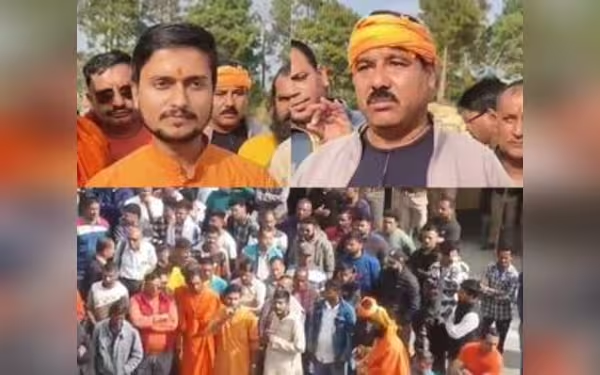Saturday, November 16, 2024 05:58 PM
Pithoragarh Protests Against Illegal Mosque Construction
- Locals demand demolition of alleged illegal mosque.
- Protests led by Himanshu Joshi gain national attention.
- Concerns raised over religious harmony in Devbhoomi.
 Image Credits: menafn
Image Credits: menafnPithoragarh locals protest against an alleged illegal mosque, demanding immediate action and raising concerns over religious harmony.
In recent days, the picturesque town of Pithoragarh in Uttarakhand has become the center of a heated debate surrounding the construction of a mosque that local residents claim is illegal. The situation escalated when a large rally was organized by local residents and Hindu organizations, who took to the streets to voice their concerns. This protest, which took place on a Sunday, was led by Himanshu Joshi, the President of the Rashtriya Seva Sangh, and saw significant participation from the majority community.
Residents have been vocal about their grievances for the past three months, urging authorities to take action against what they describe as an unauthorized mosque in Berinag. Many locals believe that the issue should have been addressed during the construction phase itself, rather than waiting for it to become a point of contention. The protest gained momentum over the weekend, with demonstrators marching through the streets, effectively shutting down the local market.
The rally commenced at Ganesh Chowk and concluded at the Tehsil office, where protesters gathered at the Government Inter College (GIC) ground. They raised slogans and staged a sit-in, demanding immediate action from the authorities. In response to the growing unrest, the Sub-Divisional Magistrate (SDM), Shrestha Gunsola, implemented Section 163 in the area, which led to police reinforcements being called in from across the district.
Reports indicate that an abandoned house in Berinag has been converted into a mosque, where Namaz is reportedly being offered. This has raised eyebrows and sparked protests from Hindu organizations, leading to an inquiry being ordered last month to investigate the matter further. The protests resumed this Sunday, with participants expressing their concerns that such constructions could disrupt the "religious harmony in Devbhoomi," a term often used to refer to the sacred nature of the region.
Himanshu Joshi, who has been at the forefront of these protests, stated, "This case has been ongoing for two months, and it's gaining attention across the country. Today's protest reflects our demand for the mosque's removal." He further added, "The administration has informed us that the matter is currently pending in court. We insist that it be cordoned off immediately and brought under control." This statement underscores the urgency felt by the protesters regarding the situation.
One protester shared his frustration over the recent demolition of his home by authorities, which was reportedly built on unauthorized land. He questioned, "If my home can be demolished, then why can't this mosque be removed? There should be one rule and one law for everyone, regardless of the nature of the structure." This sentiment resonates with many locals who feel that there should be consistency in how laws are applied.
The protests in Pithoragarh are not isolated incidents; they reflect ongoing tensions regarding alleged illegal mosque constructions in other parts of Uttarakhand, such as Uttarkashi and Dharchula. As the situation unfolds, it raises important questions about the balance between religious freedom and adherence to local laws. The residents of Pithoragarh are not just fighting for their immediate concerns but are also highlighting broader issues of governance and community relations in a region known for its diverse cultural fabric.
The protests in Pithoragarh serve as a reminder of the complexities surrounding religious structures and community sentiments in India. As the authorities navigate this contentious issue, it is crucial for all parties involved to engage in constructive dialogue to foster understanding and maintain peace in the region. The outcome of this situation could set a precedent for how similar issues are handled in the future, making it a pivotal moment for both the local community and the broader discourse on religious harmony in the country.













